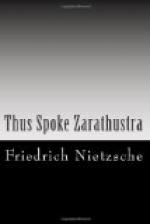|
This section contains 2,822 words (approx. 10 pages at 300 words per page) |

|
Existentialism Versus Realism: Flaubert's Madame Bovary Versus Nietzche's Thus Spoke Zarathustra
Summary: Examines the main conceptual elements of Nietzche's Thus Spoke Zarathustra with contrasting elements presented in Flaubert's Madame Bovary. Highlights uses of metaphor, twentieth century philosophy and the influence of society.
Friedrich Nietzsche presents a story that seeks to entertain, literally, and to unravel the complex philosophy of human existence. His philosophy would so influence the modern world that it would become part of the basis for all twentieth century philosophy. The philosophy that Nietzsche presents in Thus Spoke Zarathustra is important because it does truly present a mood of the time as well as a prescient for the future. Thus Spoke Zarathustra was written in the late nineteenth century during a time of rapid transformation when people's values and thoughts were tainted by governments who took advantage of the chaos and uncertainty to which the world had evolved. Nietzsche, who recognized the end of the era of the Romantics and the Realists, fulfilled the need for an explanation of this rapid change. He took a perspective that transcended the brainwashed citizens of totalitarian societies and offered shocking truths...
|
This section contains 2,822 words (approx. 10 pages at 300 words per page) |

|


